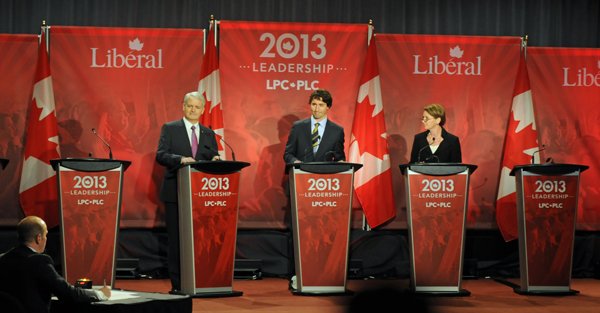Much has been made so far in this Liberal race of Justin Trudeau's Samson-like curls. Locking eyes with him in the post-debate media scrum, I couldn't help but notice: he'd trimmed his hair. I wondered, would his powers now ebb away? Or is this part of an engineered shift, from foppish fortunate son to serious statesman?
If so, he's making progress. On policy questions yesterday he was confident without sounding wonkish, inclusive without pandering. Acknowledging the Liberal Party's "difficult times over the last dozen years," he described the re-energized party he hopes to lead, one that would draw on old wisdom and young votes.
The only false note came in the final seconds of his closing statement, when he directed supporters toward his campaign site, "Justin dot ca." Joking about beating pop singer Justin Bieber to the domain, he ran out of time and had his mic cut. But to emerge from this first debate anywhere but the front of the pack, he would have had to bomb completely. He didn't.
Somewhere, I hear Stephen Harper's soft hands clapping slowly.
Harper may harbour an ideological loathing of the Trudeau dynasty, but the Conservative leader has never let ideology stand in the way of good strategy.
Paths to victory
"This is a situation where Stephen Harper's interests are served by a relatively strong result for the Liberals," says Richard Johnston. The Canada Research Chair in Public Opinion, Elections and Representation, Johnston says he's been watching "parties of the centre" falter in democracies worldwide. The more the next Liberal leader succeeds in storming back, the UBC prof says, "the more divided the non-Conservative vote is going to be."
Johnston believes the most likely route to power for the Liberals would travel once again through Quebec. Four of the nine candidates in this Liberal race are Quebecers, including frontrunners Justin Trudeau and Marc Garneau.
"My view is if you run Canadian history backwards, it suggests the Liberal party has to take advantage of the fact that the electorate in Quebec is more volatile, more flexible," says Johnston. "It's not clear to me there's an obvious route up the middle anywhere else in Canada."
Of course, the strategy would change completely under a more representative electoral system. In the debate, Trudeau affirmed his support for a system based on a ranked preferential ballot, a reform that would "completely change the tone of politics." It's a fine piece of policy, but implementing it would first require winning power. And if that attempt takes him through Quebec, sooner or later Trudeau will have to confront NDP leader Tom Mulcair and his 57 Quebec MPs. Unless there's a middle path.
Trudeau 'completely closed' to co-operation
I'll pause to mention that I attended yesterday's debate as a columnist, but also as a newly-minted Liberal "supporter." I'm one of an unknown number of Canadians so far who have taken advantage of key changes to the party constitution. Through a free, 30-second online form, anyone can sign up to vote in the race who claims not to be a member of another federal party. I've always been staunchly non-partisan, but the exercise intrigues me. No federal party has ever thrown its doors open so wide. So I was also at the debate to start kicking some tires.
I had the chance to ask Justin Trudeau for an unequivocal answer on my number-one issue as a voter, and he obliged: "I am completely closed," he said in the scrum, "to any sort of co-operation with the NDP."
To be clear, I don't like the idea of parties merging. But the more effectively the NDP, Liberals and Greens cancel out each others' efforts in the next election, the easier it will be for Harper's party -- itself an alliance -- to win.
Green Party Leader Elizabeth May, journalists discovered last week, is actively trying to broker progressive co-operation talks in Ottawa. After she sent a private letter to individual opposition MPs, Tom Mulcair clamped down on his caucus and sent May a carefully worded reply. Although he chose not to mention electoral co-operation in his letter, neither did Mulcair rule it out.
Trudeau did that yesterday. If he wins, the stage appears set for trench warfare with the NDP. Only one Liberal candidate out of nine, Vancouver Quadra MP Joyce Murray, defended the idea yesterday of "one-time electoral co-operation" to defeat the Conservatives, the goal being to implement democratic reform.
There's still time for other campaigns to come around, but so far on this issue there's a disconnect with the voters they purport to serve. Aside from realists within the Liberal Party itself, I believe there's a strong pro-cooperation constituency among the progressive Internet users the party has now invited into the race.
National pro-democracy group Leadnow began a survey on Friday of its roughly 180,000 Canadian members. More specifically, Leadnow is polling the people on its mailing list that are not already participants in its "Cooperate for Canada" campaign, launched during the last NDP leadership race.
By Sunday night, 11,228 people had replied -- Canadians from across party lines. Asked if they support co-operation between the NDP, Liberals and Greens before and after the next election, 95% said yes. That's more than 10,000 people.
The Liberals had fewer than 50,000 members heading into this leadership race. There's no reason the "supporter" category couldn't draw five or 10 times that many voters between now and the March 3 deadline. My hope is people aren't signing up simply to take part in a coronation.
MEET THE CANDIDATES
Nine candidates battled it out on the crowded stage at Vancouver's Westin Bayshore -- Liberal MP Hedy Fry territory -- for Sunday's first party leadership debate. They tackled questions such as how to repair relations with aboriginal people, address climate change, and approach Pacific Rim trade. An emotive mother and daughter asked for creative solutions to the affordable housing problem, while electoral reform and co-operation were also debated.
Few big surprises emerged. Candidate Joyce Murray was the only candidate to clearly state her support for electoral co-operation, to work with other parties to ensure a Conservative ousting next federal election. Several candidates insisted a price must be put on carbon, though few explicitly said how (Deborah Coyne did make mention of a carbon tax). Many squeezed in a Harper shot or two -- while at the same time admitting that a Liberal government has work to do on regaining the trust and interest of Canadian voters.
While platforms are still rolling out, here are the candidates:
David Bertschi: Ottawa lawyer, ran in 2011 as a federal Liberal candidate.
Martin Cauchon: Served as a Liberal MP in Quebec from 1993 to 2004.
Deborah Coyne: Ontario lawyer, ran in 2006 as a federal Liberal candidate.
Marc Garneau: Current Liberal MP in Quebec, former astronaut.
Martha Hall Findlay: Former Liberal MP in Ontario, party leadership candidate in 2006.
Karen McCrimmon: Retired Canadian Forces lieutenant colonel, ran in 2011 as a federal Liberal candidate.
Joyce Murray: Current Liberal MP in British Columbia, former provincial cabinet minister.
George Takach: Tech lawyer based in Ontario.
Justin Trudeau: Current Liberal MP in Quebec.
-- Robyn Smith ![]()
Read more: Politics, Federal Politics
















Tyee Commenting Guidelines
Comments that violate guidelines risk being deleted, and violations may result in a temporary or permanent user ban. Maintain the spirit of good conversation to stay in the discussion.
*Please note The Tyee is not a forum for spreading misinformation about COVID-19, denying its existence or minimizing its risk to public health.
Do:
Do not: